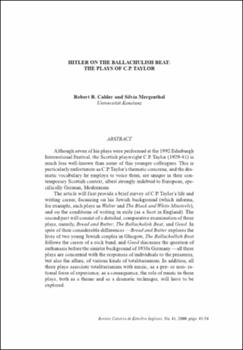Hitler on the Ballachulish Beat: The Plays of C. P. Taylor
Fecha
2000Resumen
Although seven of his plays were performed at the 1992 Edinburgh
International Festival, the Scottish playwright C.P. Taylor (1929-81) is
much less well-known than some of this younger colleagues. This is
particularly unfortunate as C.P. Taylor’s thematic concerns, and the dramatic
vocabulary he employs to voice them, are unique in their contemporary
Scottish context, albeit strongly indebted to European, specifically
German, Modernism.
The article will first provide a brief survey of C.P. Taylor’s life and
writing career, focussing on his Jewish background (which informs,
for example, such plays as Walter and The Black and White Minstrels),
and on the conditions of writing in exile (as a Scot in England). The
second part will consist of a detailed, comparative examination of three
plays, namely, Bread and Butter, The Ballachulish Beat, and Good. In
spite of their considerable differences —Bread and Butter explores the
lives of two young Jewish couples in Glasgow, The Ballachullish Beat
follows the career of a rock band, and Good discusses the question of
euthanasia before the sinister background of 1930s Germany —all three
plays are concerned with the responses of individuals to the pressures,
but also the allure, of various kinds of totalitarianism. In addition, all
three plays associate totalitarianism with music, as a pre- or non- rational
form of experience; as a consequence, the role of music in these
plays, both as a theme and as a dramatic technique, will have to be
explored.





